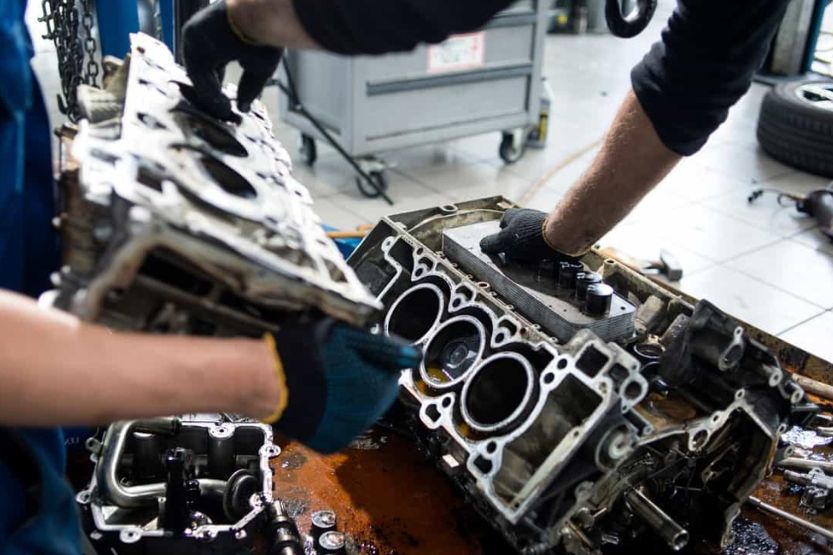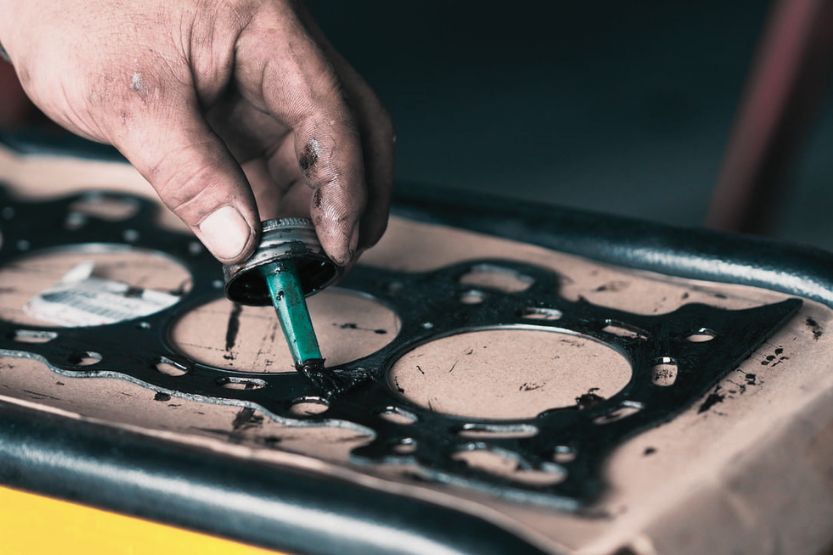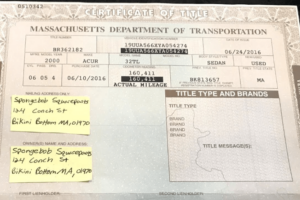You don’t want to hear the sound of the head gasket of your car’s engine because if you do, that means you are in for a costly engine repair. Do you like to know what kind of sound it makes? What does a blown head gasket sound like?
A blown head gasket sounds like air coming out sporadically, like hissing, a misfire, or an exhaust leak. It depends on how the head gasket has blown. A coolant leak could cause the kind of sound or reduced compression resulting in power loss or an overheating engine.
The cylinder’s compressed air/fuel mixture can escape when a head gasket fails. An exhaust-leaking sound will typically accompany it. The more severe repercussion is loss of compression inside the affected cylinder, leading to the engine’s rough running and reduced power.
Read on to learn more about the sound of a blown head gasket, its causes and symptoms, and its fixes.
Also, we hope you find the links here helpful. We may get a commission if you purchase something through a link on this page, so thank you.
What Does a Blown Head Gasket Sound Like?

The sound of a blown head gasket is typically like air coming out of a hose, like hissing, in an irregular manner, an exhaust leak, or the sound of a misfire. It depends on the way the head gasket blew.
The type of sound produced will depend on how it was caused, such as a coolant leak, an overheating engine, or a loss of compression that leads to power loss.
There are cases when car owners hear a knocking sound from their engines. A blown head gasket sounds like a heavy and fast exhale with a very short gap in between. It can only be heard if the engine is running. You can hear this sound if your car is relatively old.
When the head gasket blows, it will result in a loss of compression. Aside from the loss of engine power, it will also cause rough running of the engine. If it sounds like a misfire, it could be caused by the overheating of the engine or a coolant leak.
You will also notice that you can try to start the engine, but it won’t turn over, so it won’t run. But since the battery power is good, the engine will rotate. If you try it repeatedly with the same result, the battery will eventually lose its charge.
Additionally, even if you can get the starter to catch, it won’t ignite the engine. A blown head gasket is expensive to repair if it has already affected some internal parts of the engine.
How much does it cost to fix a blown head gasket? Even to replace the head gasket, your expenses could run from $1,000 to $2,000 or even more. To some people, this could mean they should scrap the engine and buy a new one.
Click here to see this head gasket on Amazon.
What Is a Head Gasket?
Location
For readers who don’t know what a head gasket is, the engine part sits between the engine block and the cylinder head. It is usually made of steel, or a special semi-flexible material such as Teflon, fiberglass, nitrile, felt, cork, silicone, or rubber.
Most often, the preferred head gasket material is fiberglass because it can withstand tremendous pressure, which is always present in an engine that is running. It must be made of sturdy material because its primary function is to keep what’s inside of the cylinders in the cylinders.
Prevents the Air and Fuel Mixture from Escaping
It prevents things or substances like the air and fuel mixture inside the cylinder from escaping outside of it. This gasket also acts as a seal to prevent outer parts or particles outside the cylinder from getting inside.
Effect of a Blown Head Gasket
If the head gasket blows, this primary seal will be broken. This means the cylinders will no longer be wholly sealed. What’s inside will escape outside, and what’s out of them could get inside.
As this happens, you will hear all sorts of sounds like an exhaust leak, misfiring, and so forth because of the loss of pressure of the compressed air and the leaking air and fuel mixture.
When you say the head gasket has blown, it doesn’t mean it blew up or exploded. Car engineers and mechanics only use this term to indicate that the seal between the engine block and the cylinder head is already compromised.
In modern terminology, the gasket has “blown over” and is now causing the leaking of the fuel or the coolant. If this occurs on your engine, it will lose power, reduce its performance, and eventually cause permanent engine damage.
What Are the Reasons Behind a Blown Head Gasket?

Overheating
Fortunately, there is only one main reason a head gasket could blow. When the engine temperature rises abnormally, if the operating temperature of an engine is not managed and controlled and increases excessively, all sorts of problems could occur, including a blown head gasket.
Causes of Overheating Engine
Engines also overheat because of many reasons. However, its temperature rises abnormally if the vehicle’s cooling system is not working correctly. Perhaps the engine coolant is already low, or there’s a leak in the cooling system or its coolant reservoir.
If an engine runs appropriately, its temperature can reach as high as 190 to 200°F. If its temperature rises more than this, it will start to overheat. Smoke will begin to come out of the engine, and the engine temperature on the dashboard will read “hot.”
This will not instantly “blow” your head gasket, but if the engine’s temperature remains exceptionally high, say about 220°F, the head gasket will deteriorate severely and “blow.” Steel and other materials expand when heated and retracts when cooled.
This repeated expansion and contraction affects the material. So, if a head gasket is subjected to expansion and retraction because of extreme heat repeatedly, at one point, it will give up, and you will have a blown head gasket.
Cooling System’s Function
This is the role of the cooling system – to regulate the temperature of combustion going on inside the cylinders by circulating and spreading the coolant throughout the engine and its components.
The process ensures that the engine materials’ expansion and contraction are controlled, so there’ll be no damage to the engine components and keep it running efficiently. With the radiator’s help, temperature control is achieved, and the car runs happily without any problem.
Again, what does a blown head gasket sound like? A blown head gasket sounds like an exhaust leak or a quick and heavy exhale. This is common in old cars.
What Are the Signs of a Blown Head Gasket?
It’s good to understand that head gaskets are not in the habit of blowing right at the start of the problem. This is a progressive head gasket issue that starts somewhere and ends elsewhere.
So, you should watch for the early signs of this problem to halt the consequences and prevent them from getting worse:
1. Low Coolant Level
If one of the causes of a blown head gasket is a coolant leak, then obviously, if you see that the coolant level is low, you can inspect your cooling system and check if there is a leak in the system, and perform the necessary steps to plug or stop the leak.
Perhaps the leak is coming from the coolant reservoir, or maybe it’s a radiator leak. Wherever the leak is, you must plug it, so it won’t cause your head gasket to blow.
This also emphasizes the importance of regularly checking the coolant levels in the radiator, the coolant, and the engine oil.
2. White Smoke from the Exhaust Pipe
If your exhaust pipe produces white smoke, the engine coolant has found its way into your exhaust system, which shouldn’t happen. Your head gasket is beginning to blow, so you must take action immediately.
3. Overheating Engine
If your engine keeps overheating and you can’t control it, it doesn’t necessarily mean that you already have a blown head gasket. While this is so, you need to be warned that it might be the beginning of this problem.
If the engine still overheats after you have topped off the oil, the coolant level, and the radiator, you are being warned that your engine is heading to a blown head gasket. An engine that keeps on overheating will also have its components deformed and damaged.
4. Foamy Coolant and Bubbles on the Radiator
The radiator is another section of your engine that will indicate if your head gasket is starting to have problems. When you see the coolant getting foamy or if bubbles are forming inside the radiator, be warned because these are the start of a head gasket blowing.
Click here to see this head gasket on Amazon.
Pop the hood of your car to check. Then turn the engine on. Look at the coolant inside the radiator and check if bubbles are forming. If bubbles are already there, your head gasket has already blown.
5. Engine Oil and Coolant Mixing in the Radiator
This is the easiest way to tell if you have a head-blown gasket without breaking the engine apart. You need to use a combustion leak tester kit to determine if gas has formed during the combustion process and has already invaded the radiator.
Insert the tester kit in the radiator. Be sure to suction off some coolant. You don’t want any amount of coolant to get inside the tester kit. Give a small space to this kit. It comes with a combustion tester fluid. If its color changes, this indicates a blown head gasket.
Can You Drive a Car with a Blown Head Gasket?

Now, you may wonder if driving your car is safe if its head gasket is already blown. Yes, you still can, but it is unsafe to do so. If you insist on driving it, you may cause permanent damage to the engine, which means you have to replace it or buy a new car.
If your budget is not a problem, that would still be ok. However, you will be forced to commute if you don’t have a budget for a new engine or car. But how can you buy a new engine or car if you don’t have the budget? So, don’t take the risk.
You can’t even drive your car to a car service shop to prevent further damage. The safest thing you can do is to call a mechanic and request them to go to your place to check your car and give their advice on the best option that you should take.
What If I Don’t Fix My Blown Head Gasket?
If you fail to fix your car’s blown head gasket and you insist on driving your car for some miles more, you will be causing further damage to your engine, resulting in more and higher expenses.
What will happen if you forget to fix this problem?
- The catalytic converter.
- The engine and its lubrication system.
- The engine will continue overheating, damaging the radiator, hoses, and cooling system.
In Closing
The sound of a blown head gasket is typically like air coming out sporadically, a misfiring sound, or an exhaust leak. It depends on the way the head gasket blew. The sound could be related to a coolant leak, reduced compression, or overheating engine.
The cylinder’s compressed air/fuel mixture will escape if the head gasket fails. A hissing sound like an exhaust leak will usually accompany it.
The more serious consequence is loss of compression inside the affected cylinder, leading to the engine’s rough running and reduced engine power.












